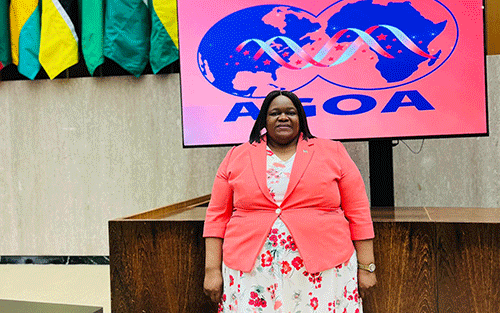Much of the trade emanating from the African Growth and Opportunity Act (AGOA), the United States (US) legislation that provides eligible sub-Saharan African countries with duty-free access to the American market, can be attributed to trade in mineral resources. This trade, noted industrialisation and trade minister Lucia Iipumbu, tends to be more capital intensive but yields fewer employment or other benefits for Africa’s small producers and traders.
“Trade in minerals has produced fewer gains in terms of diversification of exports, particularly of manufactured goods. This trade has not historically been inclusive in many regards, meaning that women and other vulnerable populations, especially in the informal sector, have not benefitted,” the minister said last week.
Iipumbu made the remarks while attending the 21st AGOA forum in Washington DC in the United States. The forum was hosted under the theme “Beyond 2025: Reimagining AGOA for an Inclusive, Sustainable and Prosperous Tomorrow”.
The event brought together ministers, senior government officials from across the United States government and AGOA-eligible countries, and representatives from key regional economic organisations, labour, civil society and the private
ector.
AGOA is a unilateral and non-reciprocal trade preference programme that provides duty-free access to the US market for eligible products from eligible sub-Saharan African (SSA) countries.
Generally, there is a need for strong advocacy for AGOA to be applied in a more inclusive manner, and how this should be reimagined, considering Africa’s regional integration efforts under the African Continental Free Trade Area (AfCFTA), one of the most significant recent developments with respect to trade diversification and stronger regional markets on the
continent.
The US Trade Act has been in existence for two decades and has, since its inception in May 2000, been amended half-a-dozen times. The current AGOA cycle stretches from July 2015 to September 2025, which is the longest extension in the history of the trade preference programme.
Some of the benefits Namibia received from AGOA are duty-free treatment for eligible products, tariff exemption to increase competitiveness against products from non-AGOA countries, availability of AGOA-related trade capacity-building support from US agencies, the potential for increased foreign direct investment (FDI), and export growth.
Iipumbu noted there is a need for strong advocacy for AGOA to be applied in a more inclusive manner, and how this should be reimagined, considering African regional integration efforts under the AfCFTA.
“Women’s entrepreneurship is a powerful force for economic growth and social change. However, despite the strides made, women still face numerous barriers that impede their full participation in the entrepreneurial ecosystem,” she pointed out.
According to the World Bank, women-owned small and medium enterprises (SMEs) account for almost 60% of Africa’s gross domestic product (GDP) and create about 450 million jobs.
Thus, Iipumbu believes this category of entrepreneurs has a huge potential to benefit from AGOA in various industries like leather, handicrafts, cosmetics, and textiles.
However, there is an urgent need to ensure the benefits are fully-inclusive.
Iipumbu also did not miss the opportunity to call for a tangible connection between the two-decade-old AGOA and the relatively new kid on the block, AfCFTA.
Africa is focusing on women’s economic empowerment through trade policy, with the African Union (AU) Assembly adopting the AfCFTA Protocol on Women and Youth in Trade, aiming for trade-led integration and shared prosperity.
“We need to advocate for policies and regulations that create an enabling environment for women entrepreneurs. This includes gender-sensitive and sector-specific policies that address explicit barriers faced by women, and promote gender equality in business. Facilitating better market access for women-owned businesses is critical,” stressed the minister. -mndjavera@nepc.com.na



